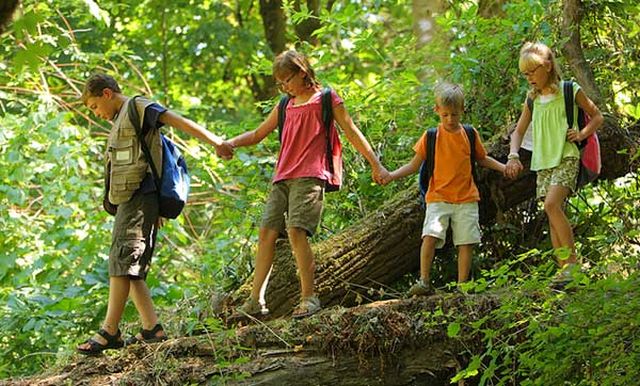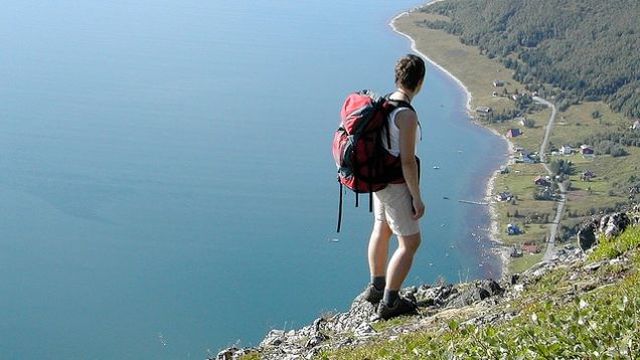Scientific Evidence: 5 Powerful Ways Hiking Alters Your Brain
 By Vandita
By Vandita
It is no secret that hiking — the long, vigorous walk on the countryside, through a forest or up a mountain — is good for your health. But just how good is hiking? It burns calories? Yes. It improves cardio-respiratory fitness? Yes. It improves muscular fitness? Yes. It helps prevent and control diabetes? Yes. The list seems endless. But do you know that hiking cleanses you mind, body and soul?
Here’re just 5 of the most powerful ways hiking actually changes your brain — supported by scientific evidence…
Hiking Lowers Rumination
A 2015 Stanford University study found that people who went on a 90-minute walk through a natural environment, reported lower levels of rumination and reduced neural activity in an area of the brain linked to risk for mental illness, compared with those who walked through an urban environment.
Widget not in any sidebars
“This finding is exciting because it demonstrates the impact of nature experience on an aspect of emotion regulation — something that may help explain how nature makes us feel better,” said Gregory Bratman, lead author of the study.
Ruminative thoughts are focused on negative aspects of the self. Examples of rumination include spending a lot of time thinking back over embarrassing or disappointing moments, or obsessing over recent things you’ve said or done.
“These findings are important because they are consistent with, but do not yet prove, a causal link between increasing urbanization and increased rates of mental illness,” added James Gross, a co-author.
Hiking Heals Cancer
By measuring oxidative stress (thought to be an important factor in the onset, progression and recurrence of cancer) rates of women with breast cancer and men with prostate cancer before and after hiking, a 2011 study conducted at German Sports University Cologne found that long distance hiking trips improve the blood’s anti-oxidative capacity, which helps fight off disease in cancer patients.
“Previously a sedentary adult, I never even considered going for a casual walk, much less hiking the forests and mountains! While in the wilds, I discovered imagination, challenges, achievement. I discovered an inner strength that I had not recognized, much less known.” — Famous author Marybeth Haydon, a breast cancer survivor who healed her lung cancer through hiking.
Hiking Lessens ADHD Effects
 Children with Attention Deficit Hyperactivity Disorder (ADHD) have a difficult time staying focused and controlling impulse. They often get distracted and exhibit excessive hyperactivity. A 2004 University of Illinois study found that symptoms of ADHD — inattention and impulsivity — are reduced after exposure to natural settings. The researchers concluded that nature experienced in a wide variety of forms, including wilderness backpacking, has been linked to superior attention, effectiveness, and effectiveness-related outcomes.
Children with Attention Deficit Hyperactivity Disorder (ADHD) have a difficult time staying focused and controlling impulse. They often get distracted and exhibit excessive hyperactivity. A 2004 University of Illinois study found that symptoms of ADHD — inattention and impulsivity — are reduced after exposure to natural settings. The researchers concluded that nature experienced in a wide variety of forms, including wilderness backpacking, has been linked to superior attention, effectiveness, and effectiveness-related outcomes.
“We conducted a study in which we took children on walks in three different settings — one especially ‘green’ and two less ‘green’ — and kept everything about the walks as similar as possible. Some children took the “green” walk first; others took it second or last. We found that, after the walk in the park, children generally concentrated better than they did after a walk in the downtown area or the neighborhood area. The greenest space was best at improving attention after exposure.” — Andrea Faber Taylor, lead author of the study.
Hiking Lowers The Risk of Depression
A 2014 University of Michigan study found that group walks in nature were associated with significantly lower depression, perceived stress, and negative effect, as well as enhanced mental well-being. Additionally, the researchers found that group walks in nature help people mitigate the effects of stressful life events on perceived stress.
“Walking is an inexpensive, low risk and accessible form of exercise and it turns out that combined with nature and group settings, it may be a very powerful, under-utilized stress buster. Our findings suggest that something as simple as joining an outdoor walking group may not only improve someone’s daily positive emotions but may also contribute a non-pharmacological approach to serious conditions like depression.” — Sara Warber, senior author of the study.
Hiking Boosts Creative Thinking
 A 2012 University of Kansas study found that hiking increases attention spans and creative analytical skills by as much as 50%. The researchers found that exposure to nature can restore prefrontal cortex-mediated executive processes (or higher order cognitive functions) such as selective attention, problem solving, inhibition, and multi-tasking.
A 2012 University of Kansas study found that hiking increases attention spans and creative analytical skills by as much as 50%. The researchers found that exposure to nature can restore prefrontal cortex-mediated executive processes (or higher order cognitive functions) such as selective attention, problem solving, inhibition, and multi-tasking.
“This is a way of showing that interacting with nature has real, measurable benefits to creative problem-solving that really hadn’t been formally demonstrated before. It provides a rationale for trying to understand what is a healthy way to interact in the world, and that burying yourself in front of a computer 24/7 may have costs that can be remediated by taking a hike in nature.” — David Strayer, Pulitzer Prize winner and a co-author of the study.
This article (Scientific Evidence: 5 Powerful Ways Hiking Alters Your Brain) is a free and open source. You have permission to republish this article under a Creative Commons license with attribution to the author and AnonHQ.com.





